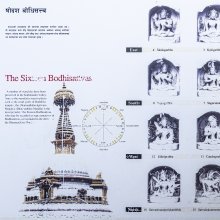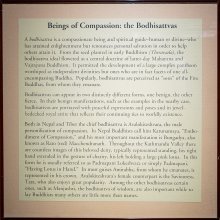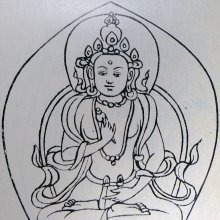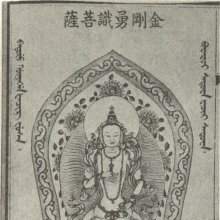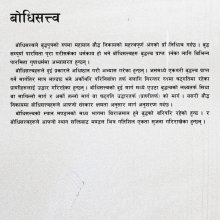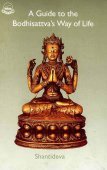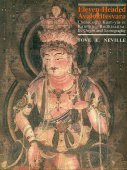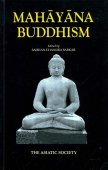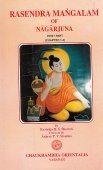Bodhisattva, Bodhisatta, Bodhi-sattva: 27 definitions
Introduction:
Bodhisattva means something in Buddhism, Pali, Hinduism, Sanskrit, the history of ancient India. If you want to know the exact meaning, history, etymology or English translation of this term then check out the descriptions on this page. Add your comment or reference to a book if you want to contribute to this summary article.
Images (photo gallery)
(+338 more images available)
In Hinduism
Purana and Itihasa (epic history)
Source: archive.org: Puranic EncyclopediaBodhisattva (बोधिसत्त्व).—A good-natured husband generally quoted in Sanskrit works. The following is the story given about him in Kathāsaritsāgara, Taraṅga 9. (See full article at Story of Bodhisattva from the Puranic encyclopaedia by Vettam Mani)

The Purana (पुराण, purāṇas) refers to Sanskrit literature preserving ancient India’s vast cultural history, including historical legends, religious ceremonies, various arts and sciences. The eighteen mahapuranas total over 400,000 shlokas (metrical couplets) and date to at least several centuries BCE.
In Buddhism
Theravada (major branch of Buddhism)
Source: Wisdom Library: Maha Prajnaparamita Sastra (Abhidharma)Bodhisattva (बोधिसत्त्व) according to the according to the 2nd century Mahāprajñāpāramitāśāstra (chapter VII).—“In the Abhidharma, the disciples of Kātyāyanīputra say: Who is called Bodhisattva? He who has awakened himself and then awakens others is called Bodhisattva; he who necessarily will become Buddha is called Bodhisattva. Bodhi is the wisdom (prajñā) of the saint who has destroyed the impurities (kṣīṇāsrava). The person born from this wisdom, protected by the sages and served by the sages, is called Bodhisattva”.
Source: Access to Insight: A Glossary of Pali and Buddhist Terms"A being (striving) for Awakening"; the term used to describe the Buddha before he actually become Buddha, from his first aspiration to Buddhahood until the time of his full Awakening. Sanskrit form: Bodhisattva.Source: Pali Kanon: Manual of Buddhist Terms and Doctrines'Enlightenment Being', is a being destined to Buddha-hood, a future Buddha.
According to the traditional belief a Bodhisatta, before reaching his last birth as a Buddha on this earth, is living in the Tusita-heaven (s. deva), the heaven of bliss. Cf. A. IV, 127; VIII, 70.
In the Pāli Canon and commentaries, the designation 'Bodhisatta' is given only to Prince Siddhattha before his enlightenment and to his former existences.
The Buddha himself uses this term when speaking of his life prior to enlightenment (e.g. M.4, M.26).
Bodhisatta-hood is neither mentioned nor recommended as an ideal higher than or alternative to Arahantship; nor is there any record in the Pāli scriptures of a disciple declaring it as his aspiration.
See bodhi and the Pail Names Dic.
Theravāda is a major branch of Buddhism having the the Pali canon (tipitaka) as their canonical literature, which includes the vinaya-pitaka (monastic rules), the sutta-pitaka (Buddhist sermons) and the abhidhamma-pitaka (philosophy and psychology).
Mahayana (major branch of Buddhism)
Source: Wisdom Library: Maha Prajnaparamita Sastra1) Bodhisattva (बोधिसत्त्व) according to the according to the 2nd century Mahāprajñāpāramitāśāstra (chapter VI).—“Bodhi is the path of the Buddhas (buddhamārga); Sattva is either a being or a great mind. The Bodhisattva is the being who is going to obtain the mind, indestructible (aheya) and infrangible (acyuta) like a diamond mountain (vajra-parvata), of the qualities (guṇa) of the Path of the Buddhas. Such is the great mind”.
There are two kinds of Bodhisattvas, with regression (vaivartika) or without regression (avaivartika) as is the case for the Arhats who are susceptible of falling back (parihāṇa-dharman) or not susceptible of falling back (aparihāṇa-dharman). The non-regressing Bodhisattvas are called the true Bodhisattvas for they are it truly; the others, the Bodhisattvas susceptible of falling back, are called Bodhisattva by extension. In the same way, those who have found the fourfold path are called the true assembly (saṃgha) for they are really it; the others, those who have not found the path, are called assembly by extension.
2) Bodhisattva (बोधिसत्त्व) or Bodhisattvabhūmi refers to the “(ten) grounds of the Bodhisattva” and represents in itself one of the ten grounds (bhūmi) shared by adepts of the three Vehicles (sādhāraṇabhūmi) according to a note from the 2nd century Mahāprajñāpāramitāśāstra (chapter XX). This (bodhisattva-bhūmi) is the shared grounds from Śukladarśanabhūmi to Kṛtāvibhūmi, as has been said above. It is also the shared grounds going from the pramuditā-bhūmi to the dharmamegha-bhūmi: all are called bodhisattva-bhūmi. Some say that all the grounds from the production of the first mind of bodhi to the diamond-like concentration (vajropama-samādhi) are called bodhisattva-bhūmi.
Source: Kunpal: Shantideva's Bodhisattva-charyavataraBodhisattvas have realized profound emptiness, the realization that their own personalities as well as all phenomena are actually empty of any self-nature. This realization is called non-dual wisdom [gnyis su med pa’i ye shes] and endows them with greater compassion for all sentient beings. Having no doubts, they do not hesitate to directly enter into any situation that could benefit beings. Such courage and compassion can only spring from absolute bodhicitta. This complete realization of bodhicitta clearly distinguishes followers of the Hīnayāna vehicle from followers of the Mahāyāna.
Bodhisattvas are heroes who pursue the benefit of other beings without the slightest hesitation. The word bodhisattva means ’a courageous being determined to gain enlightenment’.

Mahayana (महायान, mahāyāna) is a major branch of Buddhism focusing on the path of a Bodhisattva (spiritual aspirants/ enlightened beings). Extant literature is vast and primarely composed in the Sanskrit language. There are many sūtras of which some of the earliest are the various Prajñāpāramitā sūtras.
Tibetan Buddhism (Vajrayana or tantric Buddhism)
Source: archive.org: The Indian Buddhist Iconography1) Bodhisattva (बोधिसत्त्व) refers to the “worshipper” (bodhi-essence) in Vajrayāna or Tantric Buddhism.—In the realisation of the deity, there are thus three elements, the worshipper, the deity and their connection or identity. These are named in the Tantric works as the Bodhicitta, the Mantrapuruṣa (Mantra body) and the Ahaṃkāra (identity). The worshipper is called the Bodhisattva (Bodhi essence), and, his mind is known as the Bodhicitta (Will to Enlightenment). [...]
2) Bodhisattva (बोधिसत्त्व) (as a group) connote all the male deities of the Buddhist pantheon (while their female counterparts are known by the generic name of Śaktis), according to Buddhist Iconography.—The term Bodhisattva consists of two words Bodhi (enlightenrrent) and Sattva (essence) and they represent a class of deities who derive their origin from the five Dhyāni Buddhas representing the five primordial elements. The Bodhisattvas thus connote all the male deities of the Buddhist pantheon, while their female counterparts are known by the generic name of Śaktis. These Śaktis should be distinguished from the Buddhaśaktis who are the queens of the five Dhyāni Buddhas. The Bodhisattvas are sometimes represented in the company ot their Śaktis who are seated either beside them or on their laps or in close embrace.
In the Niṣpannayogāvalī, three distinct groups of sixteen Bodhisattvas are mentioned:—
First list: Samantabhadra, Akṣavamati, Kṣitigarbha, Ākāśagarbha, Gaganagañja, Ratnapāṇi, Sāgaramati, Vajragarbha, Avalokiteśvara, Mahāsthāmaprāpta, Candraprabha, Jālinīprabha, Amitaprabha, Pratibhāṅkūṭa, Pratibhānakūṭa, Sarvaśokatamonirghātamati, Sarvanivaraṇaviṣkambhin.
Second list: Maitreya, Mañjuśrī, Gandhahasti, Jñānaketu, Bhadrapāla, Sāgaramati, Akṣayamati, Pratibhānakūṭa, Mahāsthāmaprāpta, Sarvāpāyañjaha, Sarvaśokatamonirghātamati, Jālinīprabha, Candraprabha, Amitaprabha, Gaganagañja, Sarvanivaraṇaviṣkambhin.
Third list: Maitreya, Amoghadarśin, Apāyañjaha (Sarvāpāyañjaya), Sarvaśokatamonirghātamati, Gandhahasti, Suraṅgama, Gaganapañja, Jñānaketu, Amitaprabha, Candraprabha, Bhadrapāla, Jālinīprabha, Vajragarbha, Akṣayamati, Pratibhānakūṭa and Samantabhadra.

Tibetan Buddhism includes schools such as Nyingma, Kadampa, Kagyu and Gelug. Their primary canon of literature is divided in two broad categories: The Kangyur, which consists of Buddha’s words, and the Tengyur, which includes commentaries from various sources. Esotericism and tantra techniques (vajrayāna) are collected indepently.
General definition (in Buddhism)
Source: Wisdom Library: BuddhismBodhisattva:—One who desires to attain the state of Buddhahood and lives in the world of compassion.
Source: Buddhist Door: GlossaryBodhisattva in Sanskrit, Bodhisatta in Pali. A Future Buddha who is a being destined to Buddhahood. Bodhi means Enlightenment and Sattva means Sentient and Conscious. Therefore Bodhisattva refers to the sentient being of or for the great wisdom and enlightenment. Bodhisattvas vow/aim is the pursuit of Buddhahood and the salvation of others and of all. He seeks enlightenment to enlighten others. He will sacrifice himself to save the others. He is devoid of egoism and devoted to help the others. The way and discipline of Bodhisattva is to benefit the self and the others, leading to Buddhahood.Source: The Art of Asia: Who is Who in HeavenDivine beings that, although enlightened, deny themselves Buddhahood in order to help others along the path to enlightenment. Still tied to the material world in this manner, they are usually represented in sumptuous garments and adorned with jewelry and crowns (a reference to Shakyamunis earthly existence). Bodhisattvas are usually represented as extremely calm and benevolent beings.Source: WikiPedia: Buddhism1) In Buddhism, a bodhisattva is either an enlightened (bodhi) existence (sattva) or an enlightenment-being or, given the variant Sanskrit spelling satva rather than sattva, "heroic-minded one (satva) for enlightenment (bodhi)." The Pali term has sometimes been translated as "wisdom-being," although in modern publications, and especially in tantric works, this is more commonly reserved for the term jñānasattva ("awareness-being"; Tib. ཡེ་ཤེས་སེམས་དཔའ་་, Wyl. ye shes sems dpa’). Traditionally, a bodhisattva is anyone who, motivated by great compassion, has generated bodhicitta, which is a spontaneous wish to attain Buddhahood for the benefit of all sentient beings.
etymology: bodhisattva (Sanskrit: बोधिसत्त्व bodhisattva; Pali: बोधिसत्त bodhisatta)
2) In Buddhism, a bodhisattva means either "enlightened (bodhi) existence (sattva)" or "enlightenment being" or, given the variant Sanskrit spelling satva rather than sattva, "heroic minded one (satva) for enlightenment (bodhi)". Another translation is "Wisdom Being".
The various divisions of Buddhism understand the word bodhisattva in different ways, but especially in Mahayana Buddhism, it mainly refers to a being that compassionately refrains from entering nirvana in order to save others.
Source: Buddhism Tourism: Glossary of Buddhist TermsAn enlightened being who has put aside his own salvation so as to save all sentient beings.
Source: Amaravati: Glossary(Sanskrit) A term from Mahayana Buddhism, referring to one who delays complete enlightenment for the sake of helping other beings reach enlightenment first.
Source: Shambala Publications: GeneralBodhisattva Skt., lit., “enlightenment being”; in Mahāyāna Buddhism a bodhisattva is a being who seeks buddhahood through the systematic practice of the perfect virtues (pāramitā) but renounces complete entry into nirvāna until all beings are saved. The determining factor for his action is compassion (karunā), supported by highest insight and wisdom (prajñā). A bodhisattva provides active help, is ready to take upon himself the suffering of all other beings, and to transfer his own karmic merit to other beings. The way of a bodhisattva begins with arousing the thought of enlightenment (bodhichitta) and taking the bodhisattva vow (pranidhāna). The career of a bodhisattva is divided into ten stages (bhūmi). The bodhisattva ideal replaced in Mahāyāna the Hīnayāna ideal of the arhat, whose effort is directed towards the attainment of his own liberation.
India history and geography
Source: Cologne Digital Sanskrit Dictionaries: Indian Epigraphical GlossaryBodhisattva.—(CII 2-1; LL), Buddhist; a would-be Buddha in a previous birth. Cf. Chadmastha. Note: bodhisattva is defined in the “Indian epigraphical glossary” as it can be found on ancient inscriptions commonly written in Sanskrit, Prakrit or Dravidian languages.

The history of India traces the identification of countries, villages, towns and other regions of India, as well as mythology, zoology, royal dynasties, rulers, tribes, local festivities and traditions and regional languages. Ancient India enjoyed religious freedom and encourages the path of Dharma, a concept common to Buddhism, Hinduism, and Jainism.
Languages of India and abroad
Sanskrit dictionary
Source: DDSA: The practical Sanskrit-English dictionaryBodhisattva (बोधिसत्त्व).—
1) a Buddhist saint, one who is on the way to the attainment of perfect knowledge and has only a certain number of births to undergo before attaining to the state of a Supreme Buddha and complete annihilation (this position could be attained by a long series of pious and virtuous deeds); एवंविधैर्विलसितैरतिबोधिसत्त्वैः (evaṃvidhairvilasitairatibodhisattvaiḥ) Mālatīmādhava (Bombay) 1.21; उद्योतयन्नुत्त- मबोधिसत्त्वः (udyotayannutta- mabodhisattvaḥ) Bu. Ch.1.16.
2) Name of the principal Buddha of the present era.
Derivable forms: bodhisattvaḥ (बोधिसत्त्वः).
Bodhisattva is a Sanskrit compound consisting of the terms bodhi and sattva (सत्त्व).
Source: Cologne Digital Sanskrit Dictionaries: Edgerton Buddhist Hybrid Sanskrit DictionaryBodhisattva (बोधिसत्त्व).—(= Pali °satta), person destined for enlightenment, Buddha-to-be, passim; Mahāvyutpatti 625, followed by list of standard epithets of such persons incl. jinaputra; other epithets meaning son of Buddha are frequent; there are many lists of names, such as the 92 beginning Mahāvyutpatti 645; each name in such lists as occur in works here included is, generally speaking, recorded in this Dict., but e.g. the list (Ārya-)Mañjuśrīmūlakalpa 8.21 ff. is omitted because it is very corrupt and obscure, even the word-division being often doubtful; eight special B's listed Dharmasaṃgraha 12, Maitreya, Gagana- gañja, Samantabhadra, Vajrapāṇi, Mañjuśrī, Sarva- nivaraṇaviṣkambhin, Kṣitigarbha, Khagarbha, qq.v.; in Saddharmapuṇḍarīka 64.12—13 (sa tvaṃ) Śāriputra bodhisattva-saṃman- tritena °ttva-rahasyeneha mama pravacana upapannaḥ, sa tvaṃ…bodhisattvādhiṣṭhānena…, refers to Śāriputra's own saṃmantrita (q.v.) etc. as a Bodhisattva, not (with Burnouf and Kern) to the Buddha's (they use the word Bodhisattva in translating, but understand it as referring to the Buddha, which is contrary to usage).
Source: Cologne Digital Sanskrit Dictionaries: Shabda-Sagara Sanskrit-English DictionaryBodhisattva (बोधिसत्त्व).—m.
(-ttvaḥ) A Budd'ha, or Baudd'ha saint. E. bodhi intellect, sattva truth.
Source: Cologne Digital Sanskrit Dictionaries: Benfey Sanskrit-English DictionaryBodhisattva (बोधिसत्त्व).—m. a Bauddha saint. Ati-bodhi-sattva, adj. surpassing a bodhisattva, [Mālatīmādhava, (ed. Calc.)] 171, 9 (corr. dhi).
Bodhisattva is a Sanskrit compound consisting of the terms bodhi and sattva (सत्त्व).
Source: Cologne Digital Sanskrit Dictionaries: Cappeller Sanskrit-English DictionaryBodhisattva (बोधिसत्त्व).—[masculine] a Buddha immediately before the attainment of perfect knowledge.
Source: Cologne Digital Sanskrit Dictionaries: Aufrecht Catalogus CatalogorumBodhisattva (बोधिसत्त्व) as mentioned in Aufrecht’s Catalogus Catalogorum:—poet. [Subhāshitāvali by Vallabhadeva]
Source: Cologne Digital Sanskrit Dictionaries: Monier-Williams Sanskrit-English Dictionary1) Bodhisattva (बोधिसत्त्व):—[=bodhi-sattva] [from bodhi > budh] m. ‘one whose essence is perfect knowledge’, one who is on the way to the attainment of p° k° (id est. a Buddhist saint when he has only one birth to undergo before obtaining the state of a supreme Buddha and then Nirvāṇa), [Śiśupāla-vadha; Kathāsaritsāgara; Rājataraṅgiṇī; Buddhist literature] (the early doctrine had only one Bodhi-sattva, viz. Maitreya; the later reckoned many more, [Monier-Williams’ Buddhism 134, 188, 189])
2) [v.s. ...] Name of the principal Buddha of the present era (before he became a Buddha), [Śiśupāla-vadha [Scholiast or Commentator]; cf. Lexicographers, esp. such as amarasiṃha, halāyudha, hemacandra, etc.]
3) [v.s. ...] of a poet, [Catalogue(s)]
Source: Cologne Digital Sanskrit Dictionaries: Yates Sanskrit-English DictionaryBodhisattva (बोधिसत्त्व):—[bodhi-sattva] (ttvaḥ) 1. m. A Buddha.
[Sanskrit to German]
Sanskrit, also spelled संस्कृतम् (saṃskṛtam), is an ancient language of India commonly seen as the grandmother of the Indo-European language family (even English!). Closely allied with Prakrit and Pali, Sanskrit is more exhaustive in both grammar and terms and has the most extensive collection of literature in the world, greatly surpassing its sister-languages Greek and Latin.
Kannada-English dictionary
Source: Alar: Kannada-English corpusBōdhisattva (ಬೋಧಿಸತ್ತ್ವ):—
1) [noun] Gautama Buddha (563 - 483 BC) the founder of Buddhism.
2) [noun] one who is in the stage of becoming a buddha, in the next birth.
Kannada is a Dravidian language (as opposed to the Indo-European language family) mainly spoken in the southwestern region of India.
Nepali dictionary
Source: unoes: Nepali-English DictionaryBodhisattva (बोधिसत्त्व):—n. one who essence is perfect knowledge; a Buddhist saint when he has only one birth to undergo before attaining a supreme Buddhahood and complete annihilation;
Nepali is the primary language of the Nepalese people counting almost 20 million native speakers. The country of Nepal is situated in the Himalaya mountain range to the north of India.
See also (Relevant definitions)
Partial matches: Bodhi, Sattva.
Starts with (+11): Bodhisattva Sila, Bodhisattva Yana, Bodhisattvabhumi, Bodhisattvabhumisutra, Bodhisattvabuddhanusmritisamadhi, Bodhisattvacaryanirdesha, Bodhisattvacaryavatara, Bodhisattvacharyanirdesha, Bodhisattvacharyavatara, Bodhisattvagana, Bodhisattvajanman, Bodhisattvajnana, Bodhisattvakshantilabhaya, Bodhisattvamsha, Bodhisattvaniyama, Bodhisattvapakshanirdesha, Bodhisattvapitaka, Bodhisattvapratimoksha, Bodhisattvaratna, Bodhisattvas of the Earth.
Ends with: Ashtabodhisattva, Atibodhisattva, Devabodhisattva, Dhyanibodhisattva, Manjushri Bodhisattva, Sambodhisattva, Sarvabodhisattva, Shakyabodhisattva, Shribodhisattva.
Full-text (+5472): Avalokiteshvara, Kshitigarbha, Manjushri, Maitreya, Bhadrapala, Samantabhadra, Suryaprabha, Khagarbha, Sarvanivaranavishkambhin, Nakshatraraja, Anikshiptadhura, Prajnakuta, Bhaishajyasena, Trailokyavikramin, Mahavikramin, Prashantacaritramati, Mahasthamaprapta, Anantamati, Prithvigarbha, Nakshatrarajasamkusumitabhijna.
Relevant text
Search found 155 books and stories containing Bodhisattva, Bodhisatta, Bodhi-sattva, Bōdhisattva, Bothisattva, Bōthisattva; (plurals include: Bodhisattvas, Bodhisattas, sattvas, Bōdhisattvas, Bothisattvas, Bōthisattvas). You can also click to the full overview containing English textual excerpts. Below are direct links for the most relevant articles:
Vimalakīrti Sutra (by John R. McRae)
Chapter V - Mañjuśrī’s Condolence Visit < [Fascicle Two]
Chapter VI - Inconceivable < [Fascicle Two]
Mahayana Buddhism and Early Advaita Vedanta (Study) (by Asokan N.)
Chapter 2 - Mula-madhyamika-karika Nagarjuna’s Perspective (Introduction)
Chapter 4.9 - Reality in Madhyamika (h): Reality and Bodhisattva
Chapter 4.16 - Reality according to Madhyamika and Advaita (Summary)
Maha Prajnaparamita Sastra (by Gelongma Karma Migme Chödrön)
Part 11 - Attaining saṃbodhi on a bed of celestial robes < [Chapter LI - Seeing all the Buddha Fields]
Act 10.9: The transformed Sahā universe compared with the Padmāvatī universe < [Chapter XV - The Arrival of the Bodhisattvas of the Ten Directions]
3. By abstaining from any practice < [Part 5 - Ways of acquiring Prajñāpmaramitā]
The Buddha and His Teachings (by Narada Thera)
Chapter XL - The Bodhisatta Ideal
Chapter XLI - Pāramī — Perfections
The Great Chronicle of Buddhas (by Ven. Mingun Sayadaw)
Part 2 - Why are They called Pāramīs? < [Chapter 7 - On Miscellany]
Part 6b - Great Compassion and skill in ways and means < [Chapter 7 - On Miscellany]
Part 6a - Great Aspiration (abhinīhāra) < [Chapter 7 - On Miscellany]
A Discourse on Paticcasamuppada (by Venerable Mahasi Sayadaw)
Related products
(+1 more products available)
.jpg)
